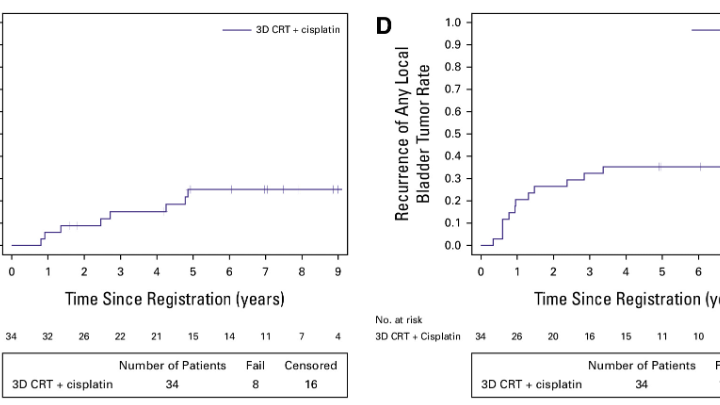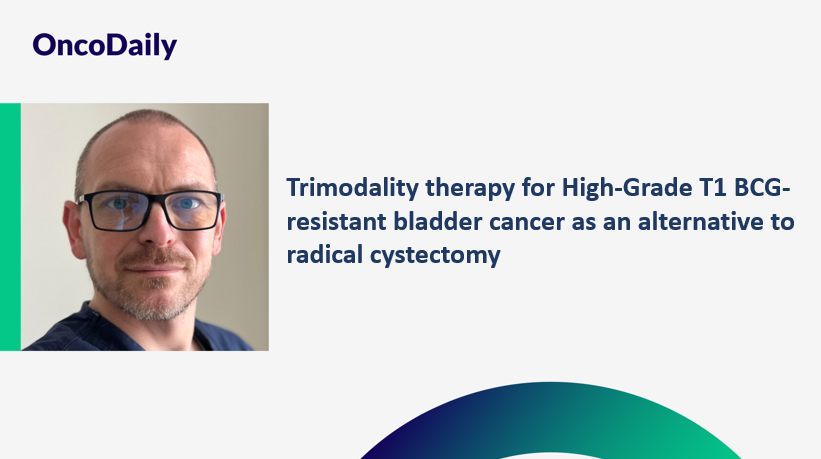Piotr Wysocki recently shared on LinkedIn:
“Douglas M. Dahle and coauthors published the results of a study investigating the efficacy of trimodality therapy as an alternative to radical cystectomy in patients with recurrent high-grade T1 bladder cancer who had failed BCG treatment.
A total of 37 patients were enrolled, with 34 completing the study. All patients had recurrent T1 bladder cancer and had undergone prior BCG therapy. The primary endpoint was freedom from cystectomy at 3 years, while secondary endpoints included distant metastasis rates at 3 and 5 years, local recurrence, disease-specific survival, overall survival (OS), and treatment safety.
Radiation therapy involved a total dose of 61.2 Gy in 34 daily fractions (approximately 7 weeks) using 3D conformal techniques. Small pelvic field irradiation was applied to the entire bladder and prostatic urethra (in men), as well as the obturator and iliac lymph nodes (internal and external). A dose of 41.4 Gy in 23 fractions was delivered, followed by a sequential boost 19.8 Gy in 11 fractions to the whole bladder, totaling 61.2 Gy.
Radiosensitizing chemotherapy included cisplatin, mitomycin, or 5-fluorouracil (5-FU), chosen by the treating physician. Cisplatin (15 mg/m2/d) was administered 3 days/wk during weeks 1, 3, and 5 of radiation therapy. Patients receiving mitomycin+5-FU were treated with mitomycin 12 mg/m2 on day 1 and infused with 5-FU at 500 mg/m2/24 h for 5 days during weeks 1 and 4 of radiotherapy. Follow-up assessments were performed every 3 months for 1 year, every 4 months during year 2, every 6 months during years 3-5, and then annually thereafter.
The study results were as follows:
- Freedom from Cystectomy: 88.2% at 3 years (only 4 patients underwent cystectomy during the study period)
- Overall Survival Rate: 69.5% at 3 years and 56.4% at 5 years.
- Local Recurrence Rate:32.4% at 3 years
- The incidence of metastasis: 12.2% at 3 years and 18.7% at 5 years.
- Adverse Events: Grade 3 or higher adverse events were reported in 64.7% of patients, with anemia, lymphopenia, and electrolyte imbalances being the most common treatment-related complications.
Trimodality therapy represents an essential bladder-preserving alternative to radical cystectomy in patients with high-grade T1 bladder cancer who failed BCG intravesical installations, offering a high rate of freedom from cystectomy and acceptable safety outcomes.”

Source: Piotr Wysocki/LinkedIn
About Piotr Wysocki
Piotr Wysocki leads the Clinical Oncology Department at University Hospital and the Faculty of Oncology at Jagiellonian University-Medical College in Krakow, Poland. As an advisor to the Polish Ministry of Health, he shapes the national cancer strategy.
His clinical expertise spans the systemic treatment of breast, gynecologic, and genitourinary cancers, with a focus on developing innovative metronomic chemotherapy-based therapies for advanced cancer patients who have undergone prior treatment.
Read other posts by Piotr Wysocki published on OncoDaily.


